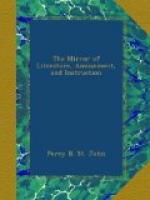A second law, which is coeval with the school law, renders it illegal for any young man to marry before he is twenty-five, or any young woman before she is eighteen; and a young man, at whatever age he wishes to marry, must show, to the police and the priest of the commune where he resides, that he is able, and has the prospect, to provide for a wife and family.—London’s Mag. Nat. Hist.
* * * * *
EATING AND WRITING.
Ovid, Horace, and Virgil all frequented the tables of the great; Cato warmed his virtue with wine; Shakspeare kept up his verve with stolen venison; Steele and Addison wrote their best papers over a bottle; Sir Walter Scott is famed for good housekeeping; and I know authors who love to dine like lords. Even booksellers do their spiriting more gently for good fare, and bid for an author the most spiritedly after dinner.
There is not a more vulgar mistake than that of confounding good eating with gluttony and excess. It is not because a man gets twenty or five-and-twenty guineas per sheet for a dashing article, and has taste to expend his well-earned cash upon a cook who knows how to dress a dinner, that he is necessarily to gorge himself like a mastiff with sheep’s paunch. On the contrary, if he means to preserve the powers of his palate intact, he must “live cleanly as a nobleman should do.” The fat-witted people in the City are not nice in their eating, quantity being more closely considered by them than quality. There is, I admit, something in the good man’s concluding conjecture, that “the sort of diet men observe influences their style.” I should know an “heavy-wet” man at the third line; and I can tell to a nicety when Theodore Hook writes upon claret, and when he is inspired by the over-heating and acrimonious stimulus of Max. Hayley obviously composed upon tea and bread and butter. Dr. Philpots may be nosed a mile off for priestly port and the fat bulls of Basan; and Southey’s Quarterly articles are written on an empty stomach, and before his crudities, like the breath of Sir Roger de Coverley’s barber, have been “mollified by a breakfast.”—New Monthly Mag.




